 TRIZ/CrePS Paper: Social Problems TRIZ/CrePS Paper: Social Problems |

 
|
‘Liberty vs Love’ and Ethics:
Principal Contradiction of Human Culture and Solution Directions |
Toru Nakagawa (Osaka Gakuin University & CrePS Institute) |
The International Conference on Creativity and Innovation 2018 (ICCI2018)
Held by Japan Creativity Society & Kindai University ICMI,
on Sept. 10-12, 2018, Osaka, Japan
Abstract  only is posted in the English page. Aug. 14, 2018 only is posted in the English page. Aug. 14, 2018
Japanese translation of a part  , posted in "TRIZ Home Page in Japan", Aug. 14, 2018 , posted in "TRIZ Home Page in Japan", Aug. 14, 2018
|
Full paper  and presentation slides and presentation slides  are posted in this English page. Nov. 11, 2018 are posted in this English page. Nov. 11, 2018
Presentation slides in Japanese translation  are posted in the Japanese page. Nov. 11, 2018 are posted in the Japanese page. Nov. 11, 2018
|
Posted on Aug. 14, 2018; Additional posting on Nov. 11, 2018 |
For going back to Japanese pages, press  buttons.
buttons.
 Editor's Note (Toru Nakagawa, Aug. 12, 2018)
Editor's Note (Toru Nakagawa, Aug. 12, 2018)
On Jul. 15, 2018 I have written a new paper in English and submitted it for the presentation at ICCI2018 (International Conference on Creativity and Innovation) to be held by Japan Creativity Society on Sept. 10-12, 2018 in Osaka. Its Discussion section is devoted for 'Implications of the presnt Hypothesese in Comparison with the conventional/standard theories of Ethics and Philosophy'. It intends to be my response to the JCS reviewers' comments: "No references to preceeding works especially in Ethics; Not sure whether the hypotheses postulated are new and reasonable in the views of preceeding knowredge; etc." For last half a year, I studied several books in Ethics closely. I now have confirmed my understanding that the Basic Hypotheses postulated in the present study are quite different from various preceeding works in reference and provide with new aspects and theory of significant importance.
In this English page, I am posting only the Abstract of the paper and Table of Contents, especially of the Discussion section. The full English paper will be posted here after ICCI2018.
I have translated a part (including Abstract, Discussions, Conclusion, and References) of the paper into Japanese, and am going to post the part in the Japanese page of "TRIZ Home Page in Japan" (on Aug. 14, 2018)  .
.
 Editor's Note (Toru Nakagawa, Nov. 4, 2018)
Editor's Note (Toru Nakagawa, Nov. 4, 2018)
Presentation slides in English are posted in HTML and in PDF. The full paper in English is also posted in this page under the kind permission by the ICCI2018 (Japan Creativity Society and Kindai University ICMI), in HTML and in PDF. This is a representative work in 2018 for me on the topic of basic philosophy of Human Culture.
Table of Contents (Simplified)
1. Introduction
2. The 0th Guiding Principle of Human Culture: Ethics
3. The First Guiding Principle of Human Culture: Liberty
4. The Second Guiding Principle of Human Culture: Love
5. Conflicts and Contradictions between Liberty and Love
6. The Role of Ethics to Liberty and Love
7. Discussion: Implications of the present Hypotheses in Comparison with the conventional/standard theories of Ethics and Philosophy
7.1 What is the real root of the directions of Ethics ?
7.2 Nature of Ethical Principles/Rules
7.3 Comments on modern Ethics, especially on Utilitarianism
7.4 Liberty vs Love Contradiction in place of Sidgwick’s Dualism of Practical Reasoning
7.5 Discussion on Rawls’ “Principle of Justice”
7.6 Liberty, Equity, and Fraternity
7.7 Concepts of Good and Happiness in the Present Study
8. Concluding Remarks
References:
 Abstract (Posted: Aug. 14, 2018)
Abstract (Posted: Aug. 14, 2018)
‘Liberty vs Love’ and Ethics:
Principal Contradiction of Human Culture and Solution Direction
Toru Nakagawa
(Osaka Gakuin University, Professor Emeritus, Japan)
To be presented at: The International Conference on Creativity and Innovation 2018 (ICCI2018)
Held by Japan Creativity Society & Kindai University ICMI,
on Sept. 10-12, 2018, Osaka, Japan
Abstract:
The present author has been working in the field of science and technology to develop TRIZ (Theory of Inventive Problem Solving) further into General Methodology of Creative Problem Solving (CrePS) which is based on a new paradigm, Six-Box Scheme.
For extending its application field, the methodology has been applied to a social issue, the low-living elderly problem in Japan. Opinions and policies of necessity of social welfare always meet anti-opinions, ‘self-responsibility for the poverty’. Using the creative thinking with TRIZ/CrePS, the present author has reduced the problem into the basic contradiction between Liberty and Love and has derived a basic hypothesis as follows:
Liberty (i.e., to decide and act for oneself, and to live) is the First Guiding Principle of Human Culture, while Love (i.e., to love one’s children, family, and neighbors and to help and protect them) is the Second Guiding Principle. Extending Liberty and Expanding (or Universalizing) Love are important and desirable. However, there exist intrinsic contradictions inside Liberty, inside Love, and between Liberty and Love; this is expressed in short as ‘Liberty vs Love’ is the Principal Contradiction of Human Culture. Principal Contradictions exist and emerge everywhere in personal lives, in social issues, in international affairs, etc. History of Human Culture has been trying to reduce/solve the contradictions but has failed.
Ethics is recognized as the 0th Guiding Principle of Human Culture. Ethics is supposed to tell us what are Good/Bad. In the present study an inherent ability (namely DNA built-in) Conscience is assumed to learn and distinguish Good from Bad, and the contents of Ethics are taught later by the society. Ethics can motivate both Liberty and Love, and hence can coordinate them to reduce the ‘Liberty vs Love’ Contradictions. The concepts of Fundamental Human Rights are the core of Ethics in the aspects of human relationships.
Reviewing the traditional/standard theories in Ethics, the hypothesis of Inherent Conscience has been found more convincing. Conscience is the results of ever-lasting evolution of living things and contain the motives of life, i.e., to live & survive (Liberty), to make offspring (Love), and to make the species prosperous (Love, communicate, no killing, etc.). Thus we have found the Inherent Conscience, at the level deeper than Common-sense Moral rules, having stable origin of motives for human life. Overall directions of the three Principal Guiding Principles together, i.e., Extending Liberty, Universalizing Love, and Deepening Ethics, are understood (the Directions of ) Good. We should follow such overall Guiding Principles (not Duty, not Rules, not Directions) in good balance of the Liberty, Love, and Ethics, because taking and insisting any part of the three would make the intrinsic contradictions among them more severe.
In conclusion, the creative problem solving methodology in science and technology fields has been successfully applied to a social problem of poverty and have created an original and systematic understanding of the philosophical basis of Human Culture. Full understanding of Liberty, Love, and Ethics is crucially significant in the future of Human Culture.
Keywords: Creative problem solving, TRIZ/CrePS, Human Culture, Principal Contradiction, Ethics
 Presentation Slides PDF
Presentation Slides PDF  (Posted: Nov. 11, 2018)
(Posted: Nov. 11, 2018)
1. Introduction
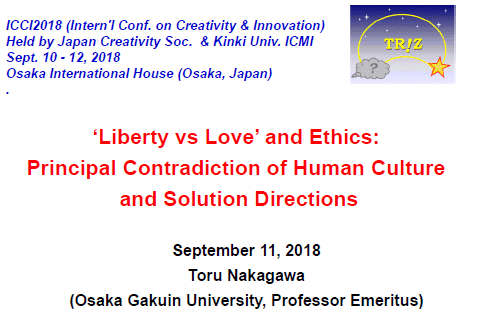
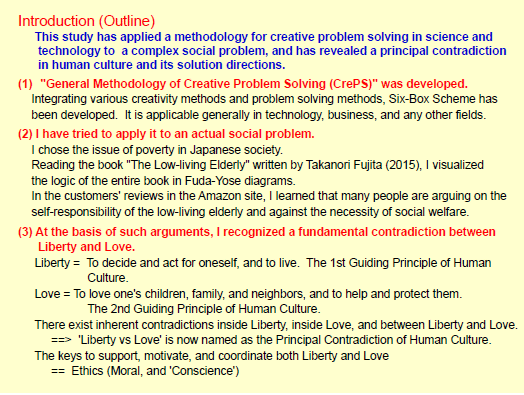
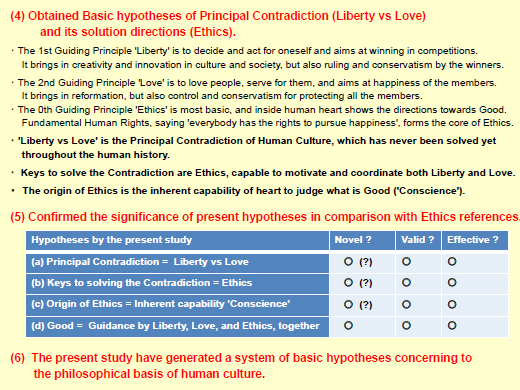
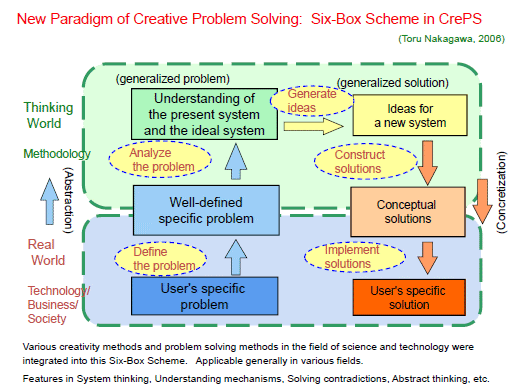
2. Approach to Social Issues: Initial Findings (2015-2016)
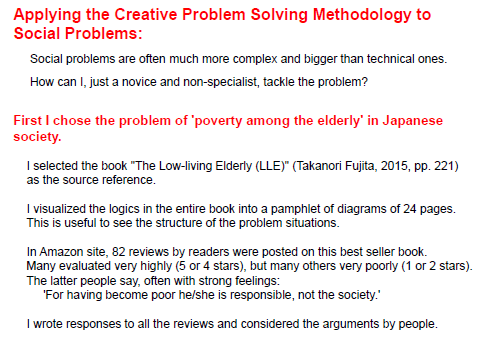
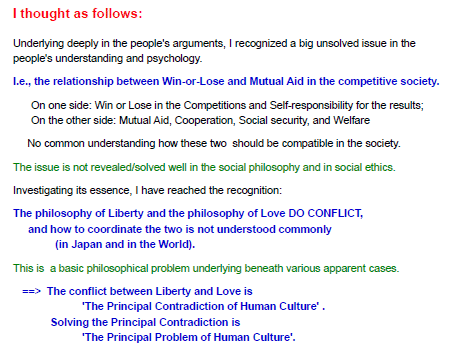
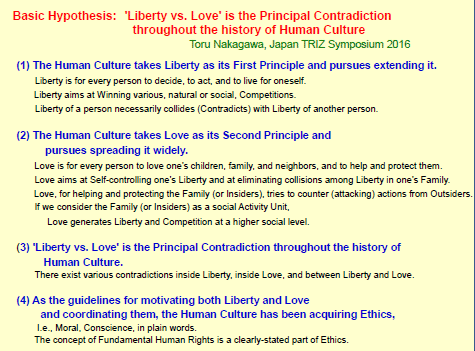
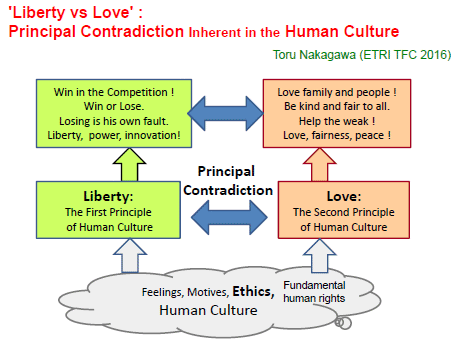
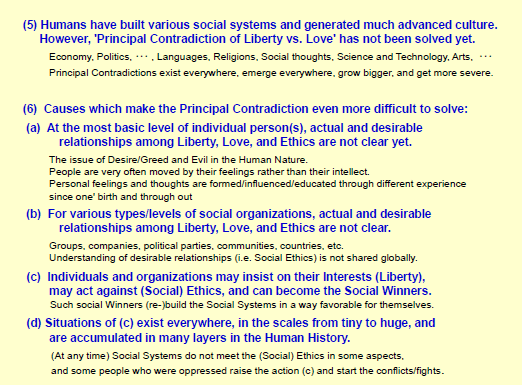
3. Investigating Further (2017-2018)
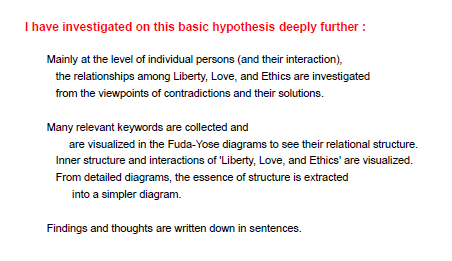
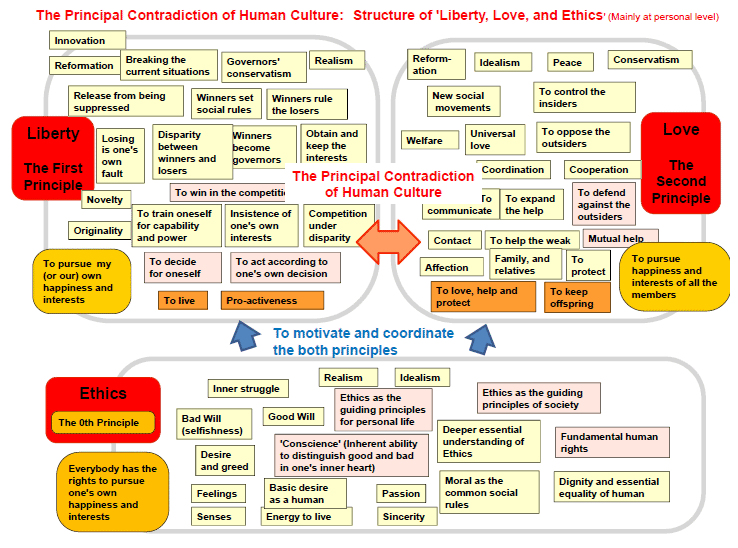
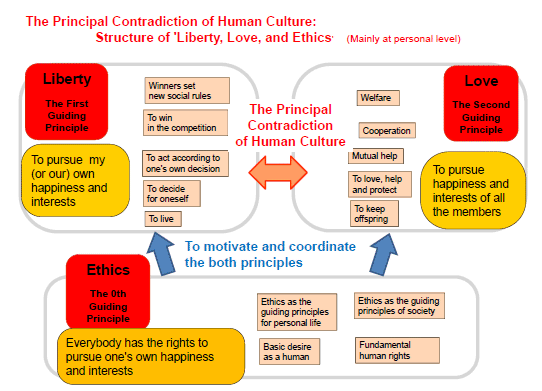
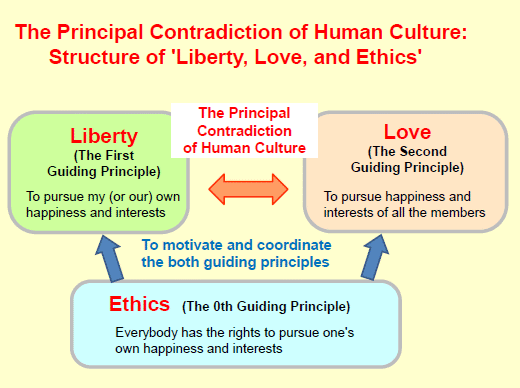
4. Basic Hypotheses of Principal Contradiction of Human Culture
4.1 0th Guiding Principle: Ethics
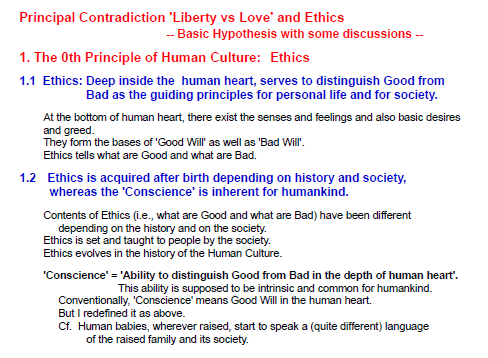
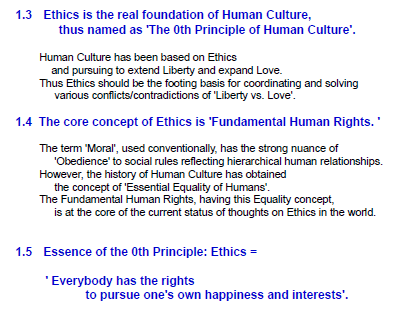
4.2 First Guiding Principle: Liberty
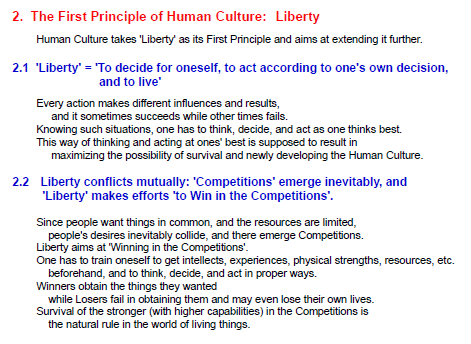
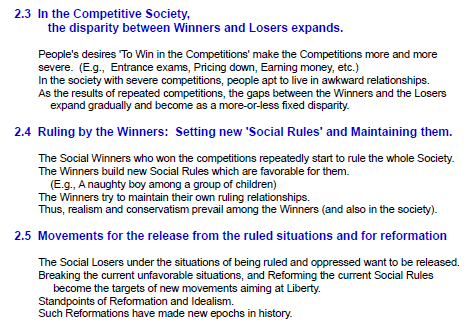
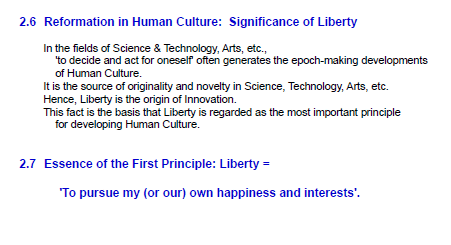
4.3 Second Guiding Principle: Love
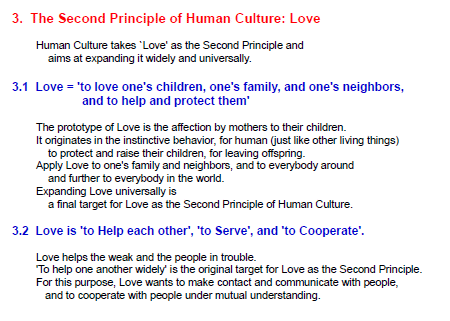
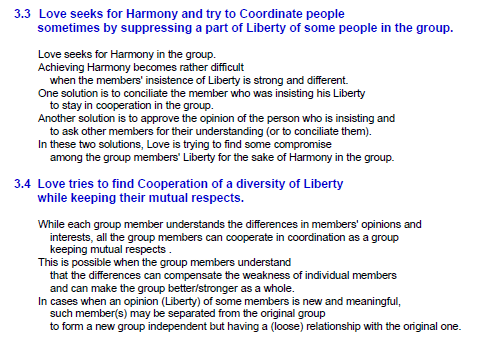
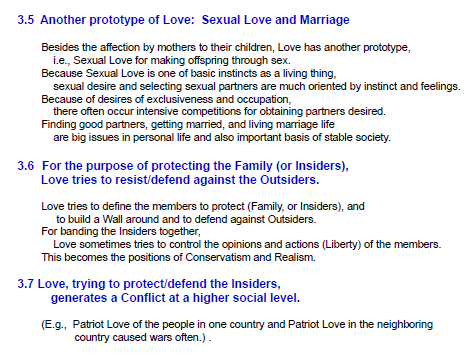
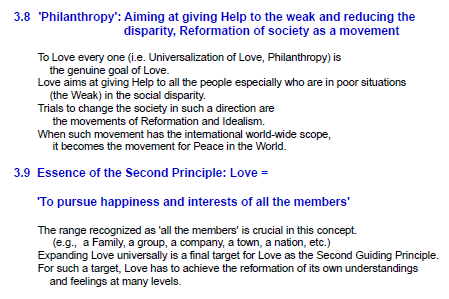
4.4 Contradictions: Liberty vs Love
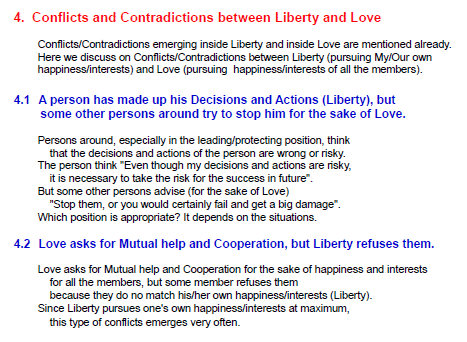
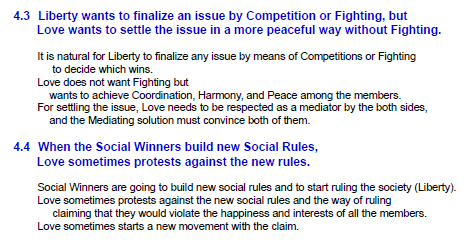
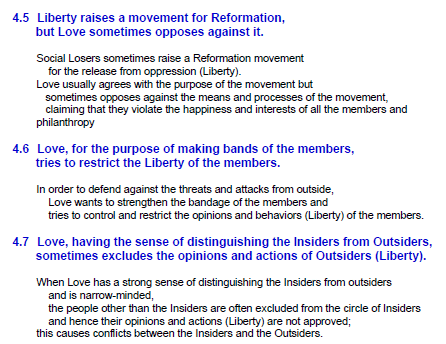
4.5 Roles of Ethics
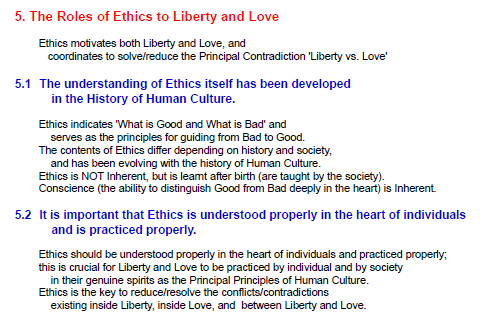
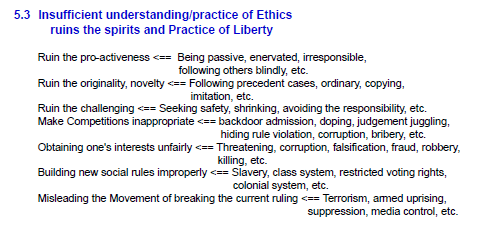
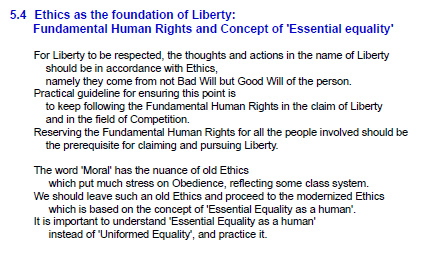
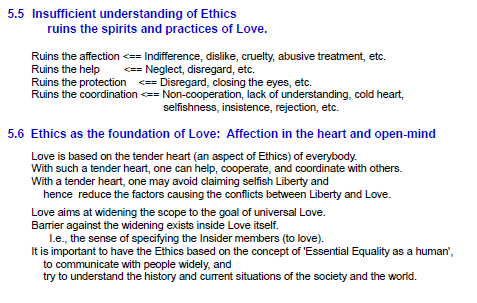
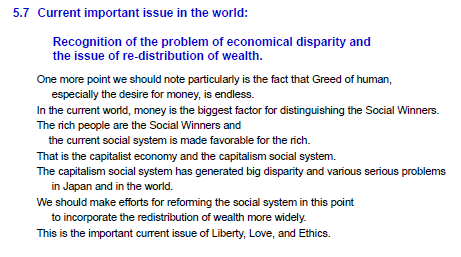
5. Discussions
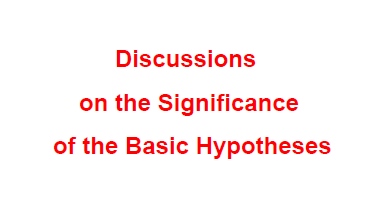
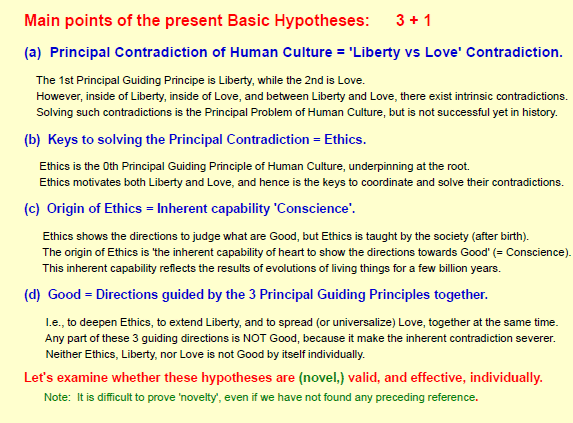
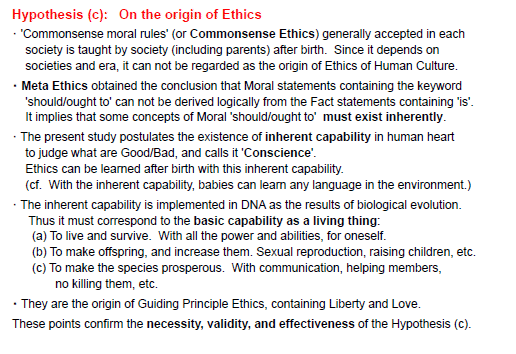
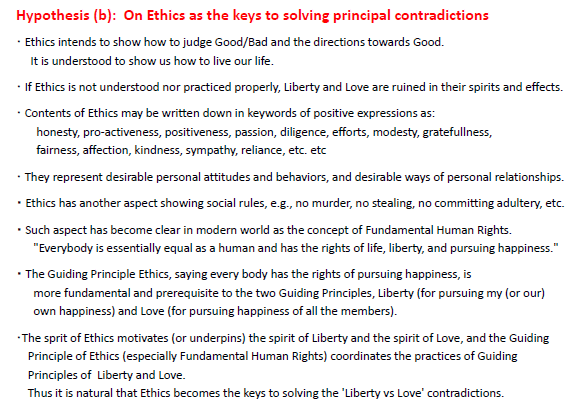
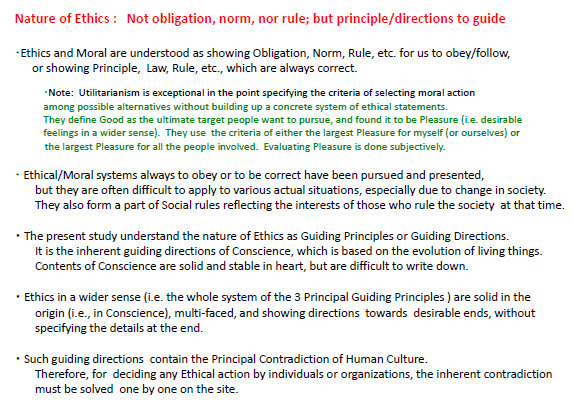
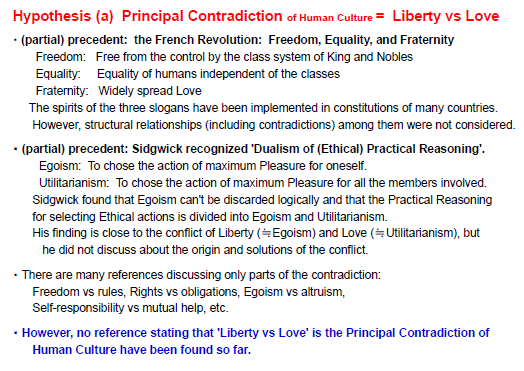
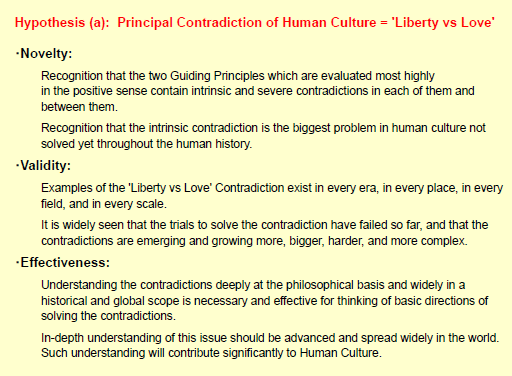
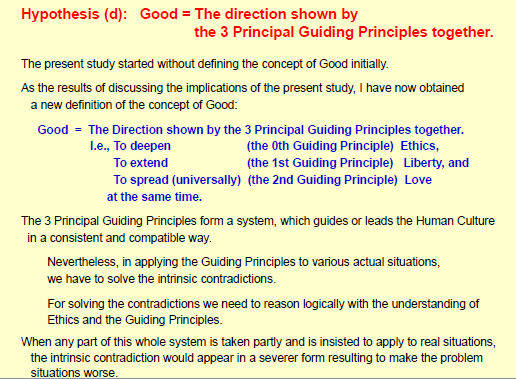
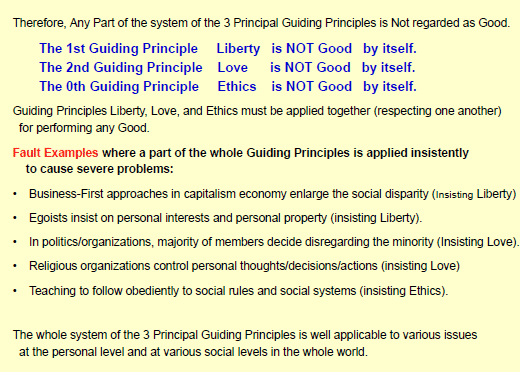
6. Conclusion
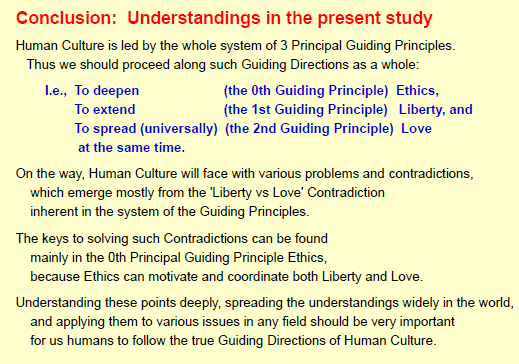
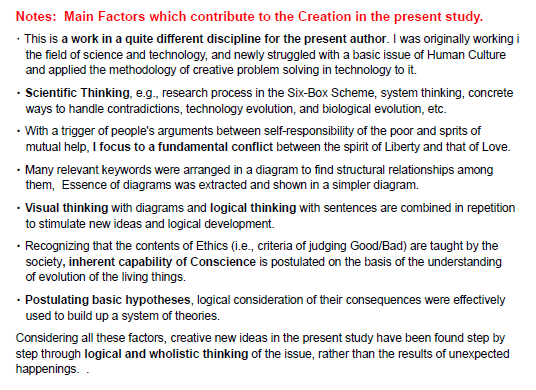
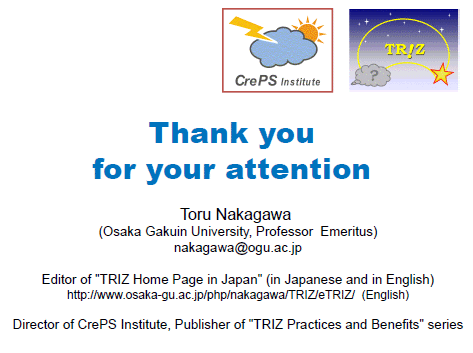
 Paper PDF
Paper PDF  (Posted: Nov. 11, 2018)
(Posted: Nov. 11, 2018)
‘Liberty vs Love’ and Ethics:
Principal Contradiction of Human Culture and Solution Direction
Toru Nakagawa
(Osaka Gakuin University, Professor Emeritus, Japan)
presented at: The International Conference on Creativity and Innovation 2018 (ICCI2018)
Held by Japan Creativity Society & Kindai University ICMI,
on Sept. 10-12, 2018, Osaka, Japan
Published in: Proceedings of ICCI2018, Fangqi Xu, Ed., ISSN 2434-3013, pp. 304-320 (2018)
1. Introduction
This is the 3rd report of applying the TRIZ/CrePS Methodology [1] to social problems and of revealing the root contradictions underlying the Human Culture [2-5].
TRIZ/CrePS is a general methodology for creative problem solving, developed in technological fields, and uses the ‘Six-Box Scheme’ as the basic process [1].
Box 1: Finding a problem and understanding the problem situations in the Real world.
Box 2: Defining the problem in focus to be solved in the Thinking world.
Box 3. Understanding the present system, in terms of mechanisms, functions, problem causes, contradictions, etc., and understanding the image of the ideal system.
Box 4. Obtaining basic ideas for new improved systems, by overcoming difficulties and solving contradictions.
Box 5. Designing conceptual solution systems which should work better solving the problems.
Box 6. Implementing new solution systems for actual use in the Real world.
For demonstrating the general capability of TRIZ/CrePS in the social/human field, we started to apply it to the problem of ‘Poverty in the Japanese society’. Using the book "The Low-living Elderly" (Takanori Fujita, 2015), I visualized its logic. In the Amazon Web site, readers’ evaluations on this best-seller book are divided into opposite sides. Readers on one side oppose the ideas of mutual help and rescue by social welfare and blame the poor themselves for their poverty. In the disputes among people, I realized that there exist a deep conflict between the philosophy of Liberty and the philosophy y of Love. Then I obtained a hypothesis as follows:
Basic Hypothesis: 'Liberty vs. Love' is the Principal Contradiction of Human Culture and left unsolved in Human History. Liberty (and its extension) is the First Guiding Principle of Human Culture, while Love (and its expansion) the Second Guiding Principle. 'Liberty vs Love' is the Principal Contradiction of Human Culture (including the contradictions inside Liberty as well as inside Love). Both Liberty and Love are motivated by Ethics and may be coordinated by it.
This hypothesis has been considered more and formalized as reported in 2016 [2].
Then the relationships between Liberty, Love, and Ethics has been investigated further mainly at the personal level [3, 4]. Many keywords relevant to Liberty, Love, and Ethics are collected and their relationships are investigated in a visual diagram, as shown in Fig. 1.

Fig. 1. Structure of 'Liberty, Love, and Ethics’ in the Principal Contradiction [3,4]
Essence of the diagram is extracted as shown in Fig. 2 [4]. This diagram clearly shows that Liberty, the First Guiding Principle, and Love, the Second Guiding Principle are both motivated by Ethics, the 0th Guiding Principle. Even though Liberty and Love are very important in Human Culture, they have contradictory relationships. And hence Ethics may be and should be the basic keys to reduce/solve the Principal Contradiction.
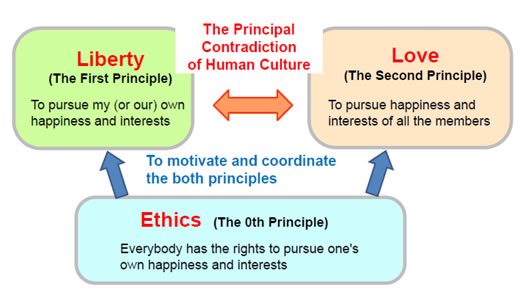
Fig. 2. Essence of Structure of 'Liberty, Love, and Ethics’ in the Principal Contradiction [4]
A system of hypotheses in the present study are formulated [3,4] as shown in Sections 2-6. The implications of the present hypotheses are discussed in Section 7 in comparison with the conventional/standard theories in Ethics and philosophy [6-12]. And the significant points in the present study are summarized in Section 8 in the aspects of creativity and creative problem solving.
2. The 0th Guiding Principle of Human Culture: Ethics [3,4]
(1) At the bottom of human heart, there exist the senses and feelings and also basic desires and greed. Ethics serves to distinguish Good from Bad deep inside the human heart. Ethics is formed to be common understanding of guiding principles of personal and social lives for each society.
(2) Contents of Ethics, i.e., what are Good and what are Bad, are formed by societies more or less differently and evolve in the history of the Human Culture. Ethics is acquired after birth through various experiences and educations. Then, what is inherent and common for the human kind? I suppose 'the ability to distinguish Good from Bad in the depth of human heart' is inherent and common for human kind. I call the ability ‘Conscience’, after redefining its conventional meaning of ‘Good Will in the human heart’. (Cf. Human babies of any birth origin have the ability of learning to speak a language of the raising family/community, wherever raised.)
(3) Human Culture has been based on Ethics and pursuing to extend Liberty and expand Love. The keys to coordinating and solving various conflicts/contradictions of 'Liberty vs. Love' are basically found in Ethics. Hence Ethics is regarded as 'The 0th Principle of Human Culture' in the present study.
(4) The conventional term 'Moral' has a strong nuance of 'Obedience' to social rules reflecting traditional hierarchical human relationships. However, the history of Human Culture has obtained the concept of 'Essential Equality of Humans'. The Fundamental Human Rights with this Equality concept is the core of thoughts on Ethics in the modern world.
(5) Essence of the 0th Principle: Ethics = ‘Everybody has the rights to pursue one's own happiness and interests'.
3. The First Guiding Principle of Human Culture: Liberty [3,4]
Human Culture takes 'Liberty' as its First Principle and aims at extending it further.
(1) Liberty = 'To decide for oneself, to act according to one's own decisions, and to live'. Every action makes different influences and results, and it sometimes succeeds while other times fails. Knowing such situations, one has to think, decide, and act as one thinks best. This way of thinking and acting at ones' best is supposed to result in maximizing the possibility of survival and newly developing the Human Culture.
(2) Liberty conflicts mutually. Since people want common things while the resources are limited, people's desires (‘Liberty’) inevitably collide, and there emerge competitions. Liberty aims at 'Winning in the Competitions'. One has to train oneself to get physical strengths, experiences, intellects, resources, etc. beforehand, and to think, decide, and act in proper ways. Winners obtain the things they wanted while Losers fail in obtaining them and may even lose their own lives. Survival of the stronger (with higher capabilities) in the Competitions is the natural rule in the world of living things.
(3) People's desires 'To Win in the Competitions' make the Competitions severe more and more. In the society with severe competitions, people apt to live in awkward relationships. As the results of repeated competitions, the gaps between the Winners and the Losers expand gradually and the disparity eventually become fixed more or less.
(4) The Social Winners who won the competitions repeatedly start to rule the whole Society. The Winners build new Social Rules which are favorable for them. The Winners try to maintain their own ruling positions. Thus, realism and conservatism prevail among the Winners (and also in the society).
(5) The Social Losers under the situations of being ruled and oppressed want to get released. Breaking the current unfavorable situations, and Reforming the current Social Rules become the targets of new movements in the name of Liberty, with the viewpoints of Idealism. Such Reformations have made new epochs in history.
(6) 'To decide and act for oneself' often generates epoch-making developments of Human Culture, especially in the fields of Science & Technology, Arts, etc.. It is the source of originality and novelty, resulting in Innovation. This fact is the basis that Liberty is regarded as the most important principle for developing Human Culture.
(7) Essence of the First Principle: Liberty = 'To pursue my (or our) own happiness and interests'.
4. The Second Guiding Principle of Human Culture: Love [3,4]
Human Culture takes `Love' as the Second Principle and aims at expanding it widely and universally.
(1) Love = 'to love one's children, one's family, and one's neighbors, and to help and protect them’. The prototype of Love is the affection by mothers to their children. It originates in the instinctive behavior, for human (just like other living things) to protect and raise their children, for leaving offspring. Expanding Love to one's family and neighbors, to everybody around, and further universally is a final target for Love as the Second Principle of Human Culture.
(2) Love helps the weak and the people in trouble. 'To help one another mutually and widely' is the original direction for Love as the Second Principle. For this purpose, Love wants to make contact and communicate with people, and to cooperate with people under mutual understanding.
(3) Love tries to coordinate people in order to seek Harmony among people in the group. When the members' insistence of Liberty is strong and different, achieving harmony becomes rather difficult. One solution is to conciliate the member who was insisting his Liberty so as to stay in cooperation in the group. Another solution is to approve the opinion of the insisting person and to ask other members for their understanding (or to conciliate them). In these two solutions, Love is trying to find some compromise among the group members' Liberty for the sake of Harmony in the group.
(4) Love tries to find Cooperation of a diversity of Liberty while keeping their mutual respects. It is desirable that each member of the group understands the differences in members' opinions and interests, and cooperates in coordination as a group while keeping mutual respects. This is possible when the group members understand that the differences can compensate the weakness of individual members and can make the group better/stronger as a whole. In other cases when an opinion (Liberty) of some members is new and meaningful, such member(s) may be separated from the original group to form a new group independent but having a (loose) relationship with the original group.
(5) Another prototype of Love is related to the sexual reproduction of offspring. It has the nature mostly common as the Love mentioned above, but is specific in its exclusiveness in pairing. Wanting and choosing a partner is motivated much by instinctive desire and feelings, and often meets competitions. Finding good partners and living fruitful marriage lives are important tasks for individuals and for society.
(6) For the purpose of protecting the Family (or Insiders), Love tries to resist/defend against the Outsiders. Love tries to define the members to protect (Family, or Insiders), and to build a Wall around and to defend against Outsiders. For banding the Insiders together, Love sometimes tries to control the opinions and actions (Liberty) of the members, resulting in the standing positions of Conservatism and Realism.
(7) Love, trying to defend the Insiders, generates a Conflict at a higher social level. (E.g., Patriot Love of the people in one country and Patriot Love in the neighboring country caused wars often.) .
(8) To Love everyone (i.e. Universalization of Love, Philanthropy) is the genuine goal of Love. Love aims at giving Help to all the people especially those in poor situations in the social disparity. Trials to change the society in such a direction are the movements of Reformation and Idealism. With the international world-wide scope, they become the movement for Peace in the World.
(9) Essence of the Second Principle: Love = 'To pursue happiness and interests of all the members'. The range recognized as 'all the members' (i.e., Family in a wider sense, Insiders) is crucial in this concept.
5. Conflicts and Contradictions between Liberty and Love [3,4]
Conflicts/Contradictions emerging inside Liberty and inside Love are mentioned already. Here we discuss on Conflicts/Contradictions between Liberty (pursuing My/Our own happiness/interests) and Love (pursuing happiness/interests of All the members).
(1) A person has made up his Decisions and Actions (Liberty), but some other persons around try to stop him for the sake of Love. Persons around, especially in leading/protecting positions, think that such decisions and actions are wrong or risky. The person thinks "Even though my decisions and actions are risky, it is necessary to take the risk for the success in future". But the others advise "Stop them, or you would certainly fail and get a big damage". Which position is appropriate? It depends on the situations.
(2) Love asks for Mutual help and Cooperation for the sake of happiness and interests for all the members, but some member may refuse them because they do no match his/her own happiness/interests (Liberty). Since Liberty pursues one's own happiness/interests at maximum, this type of conflicts emerges very often.
(3) Liberty wants to finalize an issue by Competition or Fighting, but Love wants to settle the issue in a peaceful way without Fighting. It is natural for Liberty to finalize any issue by means of Competitions or Fighting to decide which wins. Love does not want Fighting but wants to achieve coordination, harmony, and peace among the members. For settling the issue, Love needs to be respected as a mediator and the Mediating solution must convince the both sides.
(4) Social Winners are going to build new social rules and to start ruling the society (Liberty). Love sometimes protests against the new social rules and the way of ruling, claiming that they would violate the happiness and interests of all or some of the members. Love sometimes starts a new movement with the claim.
(5) Social Losers sometimes raise a Reformation movement for the release from oppression (Liberty). Love usually agrees with the purpose of the movement but sometimes opposes against the measures and processes of the movement, because of their violation of happiness and interests of all or some of the members.
(6) Love wants to strengthen the bandage of the members, in order to defend against the threats and attacks from outside, and sometimes tries to control and restrict the opinions and behaviors (Liberty) of the members.
(7) When Love is sensitive in distinguishing the Insiders from outsiders and is narrow-minded, the people other than the Insiders are often excluded from the community of Insiders and hence their opinions and actions (Liberty) are not approved; this causes conflicts between the Insiders and the Outsiders.
6. The Role of Ethics to Liberty and Love [3,4]
Ethics motivates both Liberty and Love, and coordinates them to reduce/solve the Principal Contradiction 'Liberty vs. Love'
(1) Even though the contents of Ethics (i.e., 'What are Good and What are Bad') differ depending on society and have been evolving with the history of Human Culture, Conscience (the ability to distinguish Good from Bad deeply in the heart) is supposed to be Inherent (and hence common) in the human kind. Hence, it is important that Ethics is understood properly in the heart of individuals and is practiced appropriately. This is crucial for Liberty and Love to be practiced by individuals and by society in their genuine spirits as the Principal Principles of Human Culture. Ethics is the key to reduce/resolve the conflicts/contradictions existing inside Liberty, inside Love, and between Liberty and Love.
(2) Insufficient understanding/practice of Ethics ruins the spirits and practices of Liberty. The followings are some of such examples.
Ruin the pro-activeness <== Being passive, enervated, irresponsible, following others blindly, etc.
Ruin the originality, novelty <== Following precedent cases, conventional, copying, imitation, etc.
Ruin the challenging <== Seeking safety, shrinking, avoiding the responsibility, etc.
Make Competitions inappropriate <== Backdoor admission, cunning, doping, judgement juggling, secret rule violation, corruption, bribery, etc.
Obtaining one's interests unfairly <== Threatening, corruption, falsification, fraud, robbery, killing, etc.
Building new social rules improperly <== Slavery, class system, restricted voting rights, colonial system, etc.
Misleading the Movement of Reformation <== Terrorism, armed uprising (on the movement side), suppression, media control, etc. (on the ruler side)
(3) Hence for Liberty to be respected, the thoughts and actions in the name of Liberty should be in accordance with Ethics, namely they should come from not Bad Will but Good Will of the persons. Practical guideline for ensuring this point is to keep following the Fundamental Human Rights, especially Concept of 'Essential equality', in the claim of Liberty and in the field of Competition. It is important to understand and practice 'Essential Equality as a human', instead of 'Uniformed Equality' and of ‘Obedience in traditional class system’.
(4) Insufficient understanding of Ethics ruins the spirits and practices of Love.
Ruins the affection <== Indifference, dislike, cruelty, abusive treatment, etc.
Ruins the help <== Neglect, disregard, etc.
Ruins the protection <== Disregard, closing the eyes, etc.
Ruins the coordination <== Non-cooperation, lack of understanding, cold heart, selfishness, insistence, rejection, etc.
(5) Hence Ethics is the foundation of Love. Love is based on the tender heart (an aspect of Ethics) of everybody. With such a tender heart, one can help, cooperate, and coordinate with others. With a tender heart, one may avoid claiming selfish Liberty and hence reduce the factors causing the conflicts between Liberty and Love. Even though Love has its general philosophy to spread it widely and universally, its sense of specifying the Insider members forms big barriers against widening of Love. It is important to have the Ethics based on the concept of 'Essential Equality as a human', and to communicate with people widely for understanding the history and current situations of the society and the world.
(6) One more point we should note particularly is the fact that Greed of human, especially the desire for money, is endless. In the current world, money is the biggest factor for distinguishing the Social Winners. The rich people are the Social Winners and the current social system is made favorable for them. That is the capitalism economy and the capitalism social system. The capitalism social system has generated big disparity and various serious problems in Japan and in the world. We should make efforts for reforming the social system in this point to incorporate the redistribution of wealth more widely. This is the current important issue of Liberty, the issue of Love, and the issue of Ethics as well.
7. Discussion: Implications of the present Hypotheses in Comparison with the conventional/standard theories of Ethics and Philosophy
The present Hypotheses shown so far in Sections 1 - 6 were obtained only with common-sense understanding of Ethics and Philosophy, as a researcher in science and technology. Reading several references [6-9] in Ethics and Philosophy in Japanese, I would like to discuss about the implications of my understanding in comparison with the conventional/standard theories in the field of Ethics and Philosophy. Sidgwick [10, 8] regards (dogmatic) Intuitionism, Egoism, and (Universal) Utilitarianism as the three most typical Ethical methods. Most discussions in this section address to these methods.
7.1 What is the real root of the directions of Ethics ?
Commonsense understanding of people are supposed to be: Deep inside the heart of us, we have Conscience which can judge Good/Bad intuitively and show us Good as some kind of directions for us to follow. The Conscience reflects the Commonsense Moral rules which we are taught from the society.
(Dogmatic) Intuitionism tells us: We can feel the Moral rules intuitively through Conscience and we should follow them faithfully. The Moral rules are always correct, consistent, and free from contradictions. Hence, to act following them is always Good, without being concerned to the consequences of the actions.
On the other hand, Utilitarianism tells us: We should act Good in consideration of the consequences. What is Good is not self-evident. After investigating what people pursue as ultimately desirable thing, the ultimate Good is concluded to be Pleasure (i.e., desirable feeling, in a wider sense). In Moral decisions, we should think of some alternative actions and evaluate how much Pleasure the action would bring as consequences. Then, in Egoism (i.e., Self-interested Utiltarianism), choose the action which would bring the greatest Pleasure for myself, while in Utilitarianism choose the action which would bring us the greatest Pleasure for all the persons concerned.
Intuitionism is often criticized in its non-consequentialism and blind following, because the commonsense moral rules, taught by society sometimes as religious dogma, are rigid and contain various contradictions. Utilitarianism has difficulty in the evaluation of Pleasure (or Preference later), and in response to such criticisms it chooses to regard Common-sense Moral rules as the intermediate axioms.
Meta-Ethics in 20th century [6, 11] concluded that the moral statements containing ‘should’ can never be derived from any fact statements ‘is’. Any moral statements need at the root some original ‘should’ statements implying directions. If we do not rely on Common-sense Moral rules, what can we find as the root directions?
The present study has assumed the inherent capability of our heart to find Good/Bad deep inside us and redefined the inherent capability as Conscience. We learn the Ethics, i.e. contents of what are Good and what are Bad, through our parents, society, experiences, etc., and they can be accepted only on the basis of our inherent capability of Conscience. This idea was obtained through the similarity of human ability to learn languages. Any baby can learn and speak, at the ages from 0th to 3rd, mother tongues of the raising family and community disregarding his/her genetic inherence. Functions of our brain, such as reasoning and physical movements, are learned in a similar manner. Since Conscience is inherent, it is common to all the humans and very stable in our heart, but is not easy to be described explicitly.
Shall we assume the inherent Conscience entirely blank about Good/Bad? It may be more appropriate to assume some fundamental Directions or Guiding Principles, on which we can build up Moral directions. They must have origins in the genetic evolution as living things. Such basic Guiding Principles of all living things may be characterized as: (a) To live and survive, using full capabilities, for oneself, (b) To make and increase one’s offspring, with sexual reproduction, raising children, etc., and (c) To make the species prosperous, with helping members, without killing them, with making communications, etc.
We may also assume some tier structure in our Moral sense: Inherent Conscience, Common-sense Moral rules as taught by the society, and Practical personal Moral sense built through life experiences/feelings and actually practiced in daily behaviors.
7.2 Nature of Ethical Principles/Rules
In deontology, Ethical Rules are regarded as given and obliged Duty to do, without any room for doubt or arguments. Common-sense Moral rules are often regarded as a rigid system of rules in a society, where thoughts of people are bound tightly to the rules; denying them is regarded Bad or Sin in religion. In many other Ethical standpoints, including Utilitarianism, the Ethical system are regarded as Rules or Principles, to be followed faithfully. The Utilitarianism, however, does not try to set up a concrete system of Moral rules. Since it builds the concept of Good, as the ultimately desirable objectives, and its evaluation process, it implicitly assume some Ethical Rules.
Such understanding of Ethical Rules/Principles commonly have their weak points as follows:
The intuitive moral thoughts often reflect the Common-sense Moral Rules taught by the society and urge the people to follow them obediently without critical thinking.
The Rules are assumed to be always correct and consistent with no falsity and no contradictions. Thus they must be formulated in every detail to be applied in various applications. This causes the Rules should be detailed including various limitations/exceptions.
Actually in various new and old applications there appear difficulties, conflicts, and contradictions. Especially the Rules cannot adapt historical changes in society and cannot apply to new situations.
They assume some justification or authorization, e.g., by some political or religious power. We understand such authorization reflects the interests of the authorizing power, i.e., the social winners, in the present study.
Despite such justifications, Common-sense Moral rules vary much in the historical and global views. Such Moral rules are different in various countries/communities in the world and in the time of history. Any of them is not standard or absolute; they have to admit their relativistic positions.
The differences in the Moral rules make different directions to do in actual cases. Thus they cause different standpoints in their social and personal behaviors, with various isms and cultures. The recognition of these differences is the keys to understand the relative positions for mutual understanding, on one side, but can be a trigger to doubt and reform the existing Moral rules.
In the present study, we understand Ethical Principles as the ‘Guiding Principles’ for showing us fundamental and broad directions we should go. The base is well formed and clear at the root, but the end points are open and not defined in detail. We have to apply such basic directions to actual cases of issues according to our Ethical reasoning. The base is inherent at its root as a result of evolution as living things. Then we have the second-tier base accumulated with the historical evolution of human culture and society; this second tier is not necessarily simple and consistent without falsity.
The basic tiers, especially the first one, definitely exist but their contents are not easy to write down, as usual for inherent capabilities. The Ethical Guiding Principles are multi-faced and have multiple components. They, as a whole, show us rather broad directions we should go, in divergent rather than convergent ways. In applying the guiding principles, we meet various difficulties which we have to consider, and we decide what we should do by finding alternative choices, compromising and solving contradictions, selecting the best, etc.
This is the basic finding of the present study, formulated as ‘Liberty vs Love’, the Principal Contradiction of Human Culture. Various traditional/standard Ethics have tried in vain to find some system of Ethical Principles/Rules which are consistent without any contradictions. The present study has postulated that Human Culture is based, at its root, on a sound system of Ethical Guiding Principles, which intrinsically contain Contradictions. Human Culture, not only the Ethics, has not recognized this point and has resulted in misunderstanding the essences of issues in many philosophical fields. Finding essential contradictions in problem situations is the significant approach in the TRIZ/CrePS methodology [1].
7.3 Comments on modern Ethics, especially on Utilitarianism
The concept of Good in Utilitarianism was extracted as the ‘ultimate goal/purpose of our Ethical conducts’, and hence is too abstract in comparison with people’s feelings of internal Ethical motivation. We feel that we are actually motivated with somewhat clearer guidelines. The three Guiding Principles in the present study, i.e., Liberty, Love, and Ethics, motivate us and show us directions in a much clearer way. Taking the consequences of actions into account in Utilitarianism is appropriate; it means to evaluate the consequences of possible alternative actions and choose an action to do. For evaluating the actions, Utilitarianism uses the measures of Pleasure, while the present study uses the fundamental directions of three Guiding Principles, namely deepening Ethics, extending Liberty, and expanding (or universalizing) Love. For thinking of alternative choices of actions, Utilitarianism does not provide us any methods, while the TRIZ/CrePS methodology [1] in the present study has a variety of methods and experiences for generating ideas of alternative solutions overcoming existing contradictions.
7.4 Liberty vs Love Contradiction in place of Sidgwick’s Dualism of Practical Reasoning
“The Methods of Ethics” by Henry Sidgwick is of particular significance [8,10]. It discusses 3 main methods in Ethics, they are (a) (Dogmatic) Intuitionism, (b) Egoism (or Self-interested Utilitarianism), and (c) (Universal) Utilitarianism. Both (b) and (c) agree with the concept of ultimate Good to be Pleasure, Equity of people, and Maximizing the Good as criteria for Ethical actions. While (c) pursues to maximize people’s Pleasure as well as my own Pleasure, Egoism (b) pursues only my own Pleasure without taking the position to be fair to all the people in relevance. Sidgwick found that the Egoism (b) cannot be discarded in theory, and he concluded that the Ethical Reason are divide into Dualism, i.e., Egoism and Utilitarianism.
From the viewpoint of the present study, Egoism (b) is close to insisting the Guiding Principle Liberty, while Utilitarianism (c) is close to the behaviors of the Guiding Principle Love (with some Liberty as well). Thus we may say Sidgwick’s Dualism has come close to the concept of Liberty vs Love Contradiction in the present study. Sidgwick reached the Dualism concept after his long journey with Utilitarianism and did not find its root causes and keys to overcoming it. Modern Utilitarianism had some discussions on this issue but have not succeeded in any significant findings [8]. The present author, on the other hand, arrived at the concept of Liberty vs Love Contradiction directly in the discussion of the poverty problem. The nature and problem situations of the Liberty vs Love Contradiction have been discussed closely and the key directions to overcome/reduce the contradictions are also shown in the present study.
7.5 Discussion on Rawls’ “Principle of Justice”
John Rawls postulated “Principles of Justice” in 1970s developing Utilitarianism [9,12]. His two Principles are:
(1) Each person has the same indefeasible claim to a fully adequate scheme of equal basic liberties, which scheme is compatible with the same scheme of liberties for all;
(2) Social and economic inequalities are to satisfy two conditions: (a) They are to be attached to offices and positions open to all under conditions of fair equality of opportunity; (b) They are to be to the greatest benefit of the least-advantaged members of society.
These principles are remarkable in mentioning about desirable rules of society clearly.
In this context, the present study would say: Everybody has the rights to pursue one’s own happiness and interest (The 0th Principle, Ethics), thus everybody should pursue one’s own happiness and interests (The 1st Principle, Liberty) and at the same time (everybody and the society as a whole) should pursue happiness and interests of all the members (The 2nd Principle, Love). Rawls’ theory contributed much to show a clear direction for reducing disparity in modern society, and the present study supports such a direction, from a more general understanding of Human Culture.
7.6 Liberty, Equity, and Fraternity
It is well known that the three slogans of French Revolution, i.e., Liberty, Equity, and Fraternity, have given much influences to various constitutions of many modern countries. Stress of them is the Liberty from the class system, e.g., King and nobility, and Equality of citizens and farmers etc. Fraternity became the positon of the third slogan somewhat later in mid 19the century, even though Love had long been the main theme of the Christianity. In French Revolution, the three slogans were claimed together, as compatible slogans. In the present study, the three slogans are included in the 1st Principle Liberty, a part of the 0th Principle Ethics, and the 2nd Principle Love, respectively, in the much enhanced meaning. And the present study raised them into the position of the three Principal Guiding Principles of Human Culture having the structure of intrinsic contradictions and possible keys of their resolutions.
7.7 Concepts of Good and Happiness in the Present Study
It should be noted that in the present study, concepts of Good and Happiness were not defined initially. After discussing the iimplications of the present study, the present author has come to the conclusion that Good is the ‘overall direction’ guided by the three Principal Guiding Principles of Human Culture, i.e., deepening the 0th Principle Ethics, extending the 1st Principle Liberty, and universalizing the 2nd Principle Love, together. The three Principal Guiding Principles form a system to guide Human Culture in a consistent and compatible way and yet facing with intrinsic contradictions on the way of their application to various situations.
We should note especially that extracting any one part of the whole system and insisting on it often make contradictions more severe and problem situations worse. In this sense we must understand that any single part of the whole system of the three Guiding Principles cannot be regarded as Good. Examples of inappropriate insisting of some part of the whole Guiding Principles are everywhere, such as:
Business-first approaches and resulting disparity increase in the Capitalistic Economy (insisting Liberty),
Insisting of personal interests and personal proprietary in Egoism (insisting Liberty),
Majority’s decisions of neglecting minority opinions in politics and organization managements (insisting Love),
Disregarding self-decision and Liberty in religious organizations preaching Love (insisting Love),
Teaching to be obedient to social rules and social systems (insisting Ethics),
We should also note that the present system of the three Principal Guiding Principles apply not only to personal levels but also to various social levels in the whole world.
The present study did not have any initial definition of Happiness, either. When showing Figs. 1-2 as the essence of the directions of Guiding Principles, the words ‘Happiness and Interests’ are used without definition. At this stage of conclusion, as we define Good as the overall directions guided by the whole system of Guiding Principles, we may define Happiness at the personal level as the situation where the overall directions guided by the whole system of Guiding Principles are observed for the person him/herself and in the environment around him/her. Similarly, we may define Happiness at the social level as the situation where the overall directions are observed for the social organization for itself and in the environment around it.
In conclusion we understand that Human Culture should constantly proceed toward the directions guided by the whole system of the three Principal Guiding Principles, i.e., deepening Ethics (the 0th Principle), extending Liberty (the 1st Principle), and universalizing Love (the 2nd Principle). On the way, Human Culture will face with various Contradictions, which arise from the intrinsic Liberty vs Love Contradictions in the Principal Guiding Principles. The solution directions will be found mostly with the keys of the 0th Guiding Principle Ethics, which can motivate and coordinate both Liberty and Love. It is extremely significant for us to understand these points deeply and to proliferate the findings widely and to apply them to all the activities in the world.
8. Concluding Remarks
As discussed in the above section, the basic Hypotheses postulated in Sections 2 to 6 have been demonstrated quite new and creative in comparison with the traditional/standard theories in Ethics and fulfil the large defects in the latter. The present author is a researcher in science and technology without professional training in humanity and social sciences. Thus the results created in the present study seems to be a remarkable example of innovative research brought in by a researcher out of the field. Several key points in such aspects are summarized here on the basis of previous discussions in [5].
(1) The present study started for applying the general problem solving methodology in the science and technology fields [1] to problems in the human/social field. Even though applicable theories and research methods are apparently very different in these fields, scientific ways of thinking, especially cultivated with TRIZ/CrePS [1] were found effective in the new target field.
(2) Visual thinking, i.e., many items (such as facts, issues, components, etc.) are visualized in diagrams (e.g., Figs. 1 and 2) to see their complex relationships easier, was helpful to understand the social problem situations and to build up ideas with hypotheses.
(3) Seeing arguments among people for and against social welfare, they are understood as the contradiction between the arguments for Liberty and arguments for Love. It is noted that there are many examples of contradictions of the Liberty vs Love type. Since Liberty and Love are both important goals in Human Culture, the Liberty vs Love Contradiction is found critical significance in Human Culture necessary to be investigated closely.
(4) The nature, characteristics, behaviors, consequences, etc. of Liberty and Love have been written down. At this stage, Liberty was defined ‘to decide and act for oneself, and to live’ and Love was defined ‘to love children, family, neighbors and to help and protect them’, with the fundamental motives as living things in mind. Various observations of Liberty and Love at personal and social levels have been described step by step, and negative as well as positive sides are noticed in Liberty and in Love.
(5) Various phases of conflicts in Liberty, in Love, and between Liberty and Love are described. All of them form the Liberty vs Love Contradictions.
(6) At the root of human heart we supposed conscience and Ethics. Ethics, or Moral rules, are found the keys to reduce the Liberty vs Love Contradictions. The concepts of Fundamental Human Rights are found to be crucial. Internal structure of the human heart is difficult to understand, because of various levels and aspects of feelings, desires, good/bad will, motives, reasons, etc. The inherent ability of learning and finding Good from Bad was introduced as a hypothesis of Conscience, after considering similarity of the inherent ability of learning languages..
(7) In this manner, the overall structure of the three Guiding Principles of Human Culture were built up with Liberty, Love, and Ethics. So far the system thinking, concepts of contradictions and their solution methods, etc. played the most important roles.
(8) Studying the references of Ethics, the present study has been much enhanced in its philosophical basis, as discussed in Section 7. The hypothetical introduction of inherent Conscience has been proved necessary and reasonable. All the three Guiding Principles in the present study are found their strong bases on the inherent evolution of living things.
(9) The inherent Conscience is separated from socially acquired Common-sense Moral rules. This has solved the arguments between Intuitionism and Utilitarianism in Ethics, by giving a new clear-cut understanding. The understanding of Ethical directions as ‘Guiding directions’ are clearer than the understanding of Duty, Directions, and (Utilitarian) alternatives to decide after consequential evaluation.
(10) Instead of a system of Moral rules without contradiction, which have been searched for in vain, a new system of Ethics has been found around Liberty, Love, and Ethics. Extending Liberty, Expanding (or Universalizing) Love, and Deepening Ethics are the stable and strong Guiding Directions of Human Culture, applicable at personal levels and at various social levels as well. In applying Guiding Principles, we need to solve intrinsic Contradictions.
(11) Finally Good is defined as the overall Guiding Directions shown by Liberty, Love, and Ethics. Taking and insisting any single part of the overall Guiding Principles is never Good, because it make the Contradictions more severe, causing various undesirable results. Happiness is understood as the situations where the overall directions guided by the whole system of Guiding Principles are observed for the person him/herself and in the environment.
It is remarkable that all the above steps (1) through (11) have been achieved smoothly, by introducing scientific inference and reasoning step by step. Further investigations will be necessary at the personal levels and at various social levels.
References:
[1] Nakagawa T (2016) , CrePS (General Methodology of Creative Problem Solving) beyond TRIZ: What, Why, and How?, TRIZCON2016 held by Altshuller Institute for TRIZ Studies, Mar. 2-5, 2016, New Orleans, USA; THPJ, Jun. 20,2016.
[2] Nakagawa T (2016), TRIZ/CrePS Approach to the Social Problems of Poverty: 'Liberty vs. Love' Is Found the Principal Contradiction of the Human Culture, ETRIA TRIZ Future Conference, Oct. 24-27, 2016, Wroclaw, Poland; THPJ, Nov. 12, 2016
[3] Nakagawa T (2017), 'Liberty vs. Love': The Principal Contradiction of Human Culture (2) The 'Liberty vs. Love' Contradiction and 'Ethics' at the Personal Level, Japan Creativity Society, Annual Research Conference, Sept. 9-10, 2017, Yokohama (in Japanese)
[4] Nakagawa T (2017), 'Liberty vs. Love': The Principal Contradiction of Human Culture (2) The 'Liberty vs. Love' Contradiction and 'Ethics' at the Personal Level, European TRIZ Association , TRIZ Future Conference (TFC) 2017, Oct. 4-6, 2017, in Finland; Journal of the European TRIZ Association, INNOVATOR, ISSN 1866-4180, 02/2017 Volume 04, pp. 97-104 . http://www.etria.eu/innovator/ETRIAjournal2017vol04.pdf
[5] Nakagawa T (2018), 'Liberty vs. Love': The Principal Contradiction of Human Culture (2) The 'Liberty vs. Love' Contradiction and 'Ethics' at the Personal Level, TRIZ Home Page in Japan, posted Jun. 25, 2018 (Extended paper of [3] in Japanese)
[6] Komatsu M., Tarui M., Tani S., ed. (2006), Guide to Ethics: Theories and Issues, Keio University Press, pp. 312 (in Japanese)
[7] Shinagawa T., (2015), A Talk about Ethics, Nakanishiya Press, pp. 276. (in Japanese)
[8] Okuno M. (1999), Sidgwick and Modern Utilitarianism, Keiso Shobo, pp. 313 (in Japanese)
[9] Kawamoto T. (2005), Rawls: Principles of Justice, in Explorers of Modern Thoughts Series, Kodansha, pp. 303 (in Japanese)
[10] Sidgwick H. (1874), The Methods of Ethics, (1st Edition)
[11] Hare R.M. (1961), The Language of Morals,Oxford.
[12] Lawls J. (1971), A Theory of Justice,
Note: THPJ: TRIZ Home Page in Japan, URL= http://www.osaka-gu.ac.jp/php/nakagawa/ TRIZ/eTRIZ/
Author’s profile (up to 200 words)
Toru Nakagawa is Professor Emeritus of Osaka Gakuin University since 2012. He was originally a researcher in physical chemistry in academia (1963-1980), then a researcher and research managing staff in a computer industry (1980-1998), and became Professor of Osaka Gakuin University in information science (1998-2012). In 1997 he encountered TRIZ (Theory of Inventive Problem Solving) and started the research in creative problem solving methodology and its proliferation as a life work. In 1998 he established a public Web site “TRIZ Home Page in Japan” (in Japanese and in English) and has been operating it actively as the Editor for nearly 20 years till present. His research themes gradually shifted as (a) Introduction and proliferation of (classical and modernized) TRIZ, (b) Introduction and further development of USIT (Unified Structured Inventive Thinking) Method, (c) Development of Generalized Methodology for Creative Problem Solving (CrePS) with the new paradigm of the ‘Six-Box Scheme’, and recently (d) Application of TRIZ/CrePS methodology to social problems. He has found ‘Liberty vs Love’ is the Principal Contradiction of Human Culture and Ethics the keys to solving it. Thus, “Liberty, Love, and Ethics” has become his main work now and in future.
Last updated
on Nov. 11, 2018 Access point: Editor: nakagawa@ogu.ac.jp
only is posted in the English page. Aug. 14, 2018
, posted in "TRIZ Home Page in Japan", Aug. 14, 2018
and presentation slides
are posted in this English page. Nov. 11, 2018
are posted in the Japanese page. Nov. 11, 2018










































